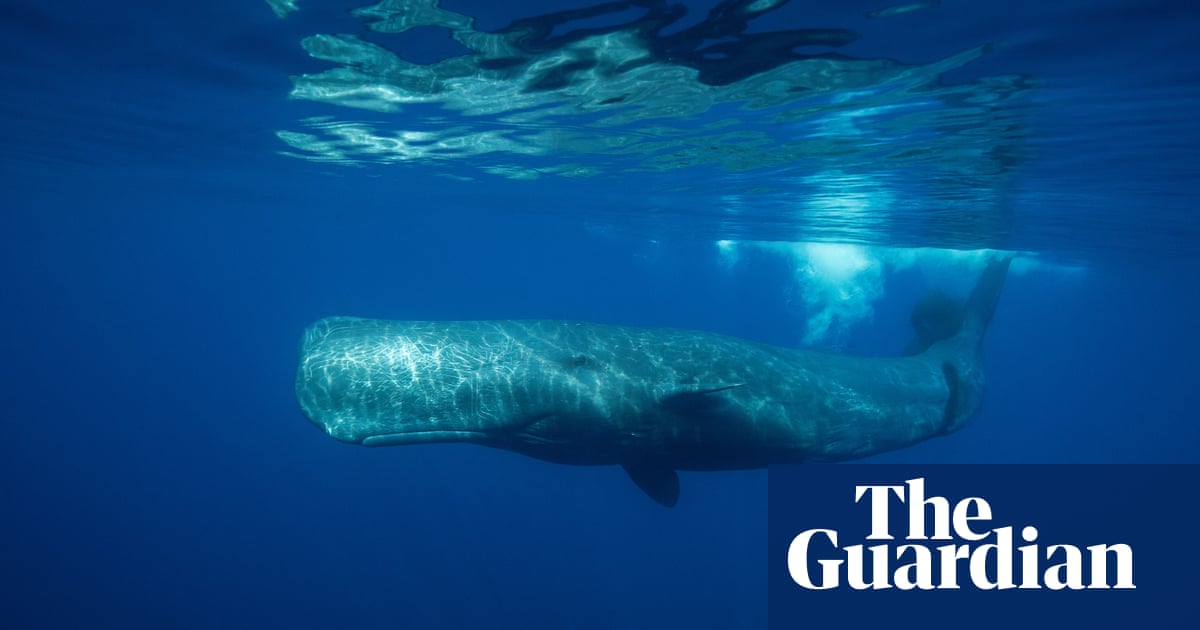
Dominica, a small island in the Caribbean, is establishing the first ever marine sanctuary for the protection of the sperm whale, one of the largest animals on our planet that is currently at risk of extinction.
The government declared on Monday that a reserve will be designated for approximately 300 square miles (800 square kilometers) of royal blue waters, located on the western side of the country. These waters are crucial for nursing and feeding purposes.
The prime minister of Dominica, Roosevelt Skerrit, stated that it is important to protect these magnificent and intelligent creatures and maintain the health of our waters and climate.
Researchers state that the reserve will not only safeguard the animals, but also aid in combating the climate emergency.
Sperm whales release their waste near the surface due to their ability to shut down non-essential bodily functions while diving to depths of up to 10,000ft (3,000 meters). This results in nutrient-rich feces remaining at the ocean’s surface, leading to the growth of plankton blooms. These blooms absorb carbon dioxide from the atmosphere and transport it to the ocean floor when they die. According to Shane Gero, a whale biologist and creator of the Dominica Sperm Whale Project, sperm whales in Dominica are known to defecate more frequently than those in other areas. The research program focuses on studying sperm whales in the eastern Caribbean region.
The reason for the increased defecation of sperm whales in Dominica remains uncertain. Gero hypothesizes that they may be consuming double the amount of food or could be consuming a unique type of squid.
According to Gero, sperm whales are playing a role in combatting climate change for us.
According to estimates, the waters near Dominica are home to less than 500 sperm whales. These whales are part of a larger population that migrates along the Lesser Antilles islands, with some traveling as far south as St Vincent and others heading north into Guadeloupe. Unlike sperm whales in other parts of the world, those in the eastern Caribbean tend to stay in relatively close proximity, as noted by Gero.
According to him, sperm whales have a social structure based on the female lineage, where young males leave and move between oceans at some stage in their lives. Therefore, safeguarding the species is crucial, especially if there are a limited number of female calves being born.
He stated that if a single calf gets caught, it could potentially lead to the demise of an entire family.
Sperm whales have the ability to give birth to one calf every five to seven years.
Sperm whales in areas such as Dominica have faced challenges such as collisions with ships, becoming trapped in fishing equipment, and exposure to pollutants from agriculture, all of which have decreased their chances of survival. Prior to the era of commercial whaling, it is believed that there were approximately 2 million sperm whales living in the Earth’s oceans. However, with the demand for their oil for lighting and machinery, this number has dwindled to approximately 800,000, according to Gero.
The Dominican government announced that the reserve will promote responsible small-scale fishing and establish a designated route for international ships to prevent further harm to sperm whales. These creatures have the largest brain among all animal species and can reach lengths of up to 50ft (15 meters).
After establishing the reserve, the prime minister stated that his government will designate an official and monitors to guarantee the region is honored and that rules for whale tourism are upheld. While visitors are still allowed to swim with sperm whales and view them from a boat, there will be restrictions on the number of people.
The decision was commended by experts and environmentalists, including Enric Sala, a resident explorer for National Geographic.
The Dominica government acknowledges that the sperm whales, who inhabited the area before humans, are also considered citizens of Dominica. These whales typically reside offshore the island for the majority of the year, and the government is ensuring their well-being in a manner that few other nations have done.
Around Dominica, there are approximately 35 families of sperm whales that primarily reside in the surrounding waters. According to Gero, some of these whales may be over 60 years old and they communicate using clicking sounds, a form of vocalization called codas.
Gero stated, “It’s similar to inquiring, ‘Are you also from Dominica?'” He explained, “It’s a symbolic identifier.”
Source: theguardian.com


